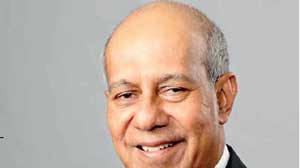Thursday Feb 19, 2026
Thursday Feb 19, 2026
Tuesday, 17 October 2017 00:14 - - {{hitsCtrl.values.hits}}
Central Bank Monetary Board Member Nihal Fonseka appeared before the Presidential Commission of Inquiry on the controversial bond issuance yesterday, where his views were sought as a senior banking expert on a number of matters pertaining to the case.
Responding to questions raised by Commissioner Justice Prasanna Jayawardena, Fonseka said using direct placements over a prolonged period of time to artificially suppress interest rates could be dangerous as it’s not a sustainable practice.
“I wouldn’t categorically say it’s wrong,” he said, but agreed that, depending on the period, it would indeed be dangerous.
Asked for his views on the merits and demerits of direct placements, the witness said direct placements do have a place provided the process was transparent and all parties involved were on the same page when it comes to their ability to participate.
“I wouldn’t say it’s completely bad, but it’s possible through the direct placements system to sometimes favour people,” said Fonseka.
Citing research he had carried out, Fonseka said many countries, including some advanced nations, have adopted the system, though he presumed those countries had brought in safeguards to ensure transparency.
Concerning the relative advantages and disadvantages of direct placements versus auctions, the senior banker said: “You can’t say one is better than the other,” adding that a mix of both systems - the mix being dependent on the country’s circumstances - was necessary.
“The advantages of both systems are self evident.”
By early 2015, said Justice Jayawardena recounting evidence previously led before the commission, 80% of funds had been raised through direct placements for about eight years. If a decision had been taken to stop this practice, what ought to be done within the Central Bank, he asked.
“It should’ve been done after careful study,” said Fonseka.
Such a decision should have been reached, said the banker, after looking at what other options were available to the Central Bank to discharge its obligations in terms of the Monetary Law Act.
An arbitrary and sudden decision to change the system, he said, can have “quite an impact” on the market and “introduce a level of volatility that isn’t desirable.”
Justice Jayawardena then asked what a sudden stop in direct placements would have on the government securities market, the Treasury bond yield curve and interest rates in general.
Fonseka responded that at least for a while - perhaps it could be stabilised later - such an action would result in rates being pushed up, as it would become know that the Government needs money.
The witness further said there was no immediate necessity to increase interest rates, as credit growth had started to pick up but not at an alarming rate.
Representing former Central Bank Governor Arjuna Mahendran, President’s Counsel Romesh De Silva questioned Fonseka on his relationship to his client’s predecessor Ajith Nivard Cabraal.
Pointing out that the witness was Cabraal’s first cousin and that he had been CEO of DFCC during his cousin’s tenure as Governor, the senior lawyer asked Fonseka if there was anything wrong with that and if there was any conflict of interest there. The witness responded that he didn’t see anything wrong with that relationship, and added that there was no conflict of interest.
De Silva brought to the witness’ attention a number of relationships to Cabraal: His brother-in-law Ravi Thambiayah, who was a director of DFCC, Thambiayah’s daughter who succeeded him (both of whose appointments were sent for ratification to the Central Bank, where Cabraal was Governor), Cabraal’s brother-in-law Sunil Wijesinha who was Chairman of NDB, and sister-in-law Dhara Wijeyatillake who was a director of Sampath Bank.
Fonseka agreed with the president’s counsel’s suggestion that there was nothing wrong with any of these.
Fonseka, said De Silva, was Chairman of Acuity Partners, a subsidiary of which is a primary dealer. Asked if there was nothing wrong with this despite the Governor being a cousin and the “close association” to him, Fonseka said though they were related, the two had grown apart professionally.
The witness also said he was a non-executive chairman of Acuity Partners and therefore not involved in its day-to-day activities.
“I had nothing to do with any of the bids that anybody placed,” he said, adding that he was CEO of DFCC long before Cabraal was appointed Governor.